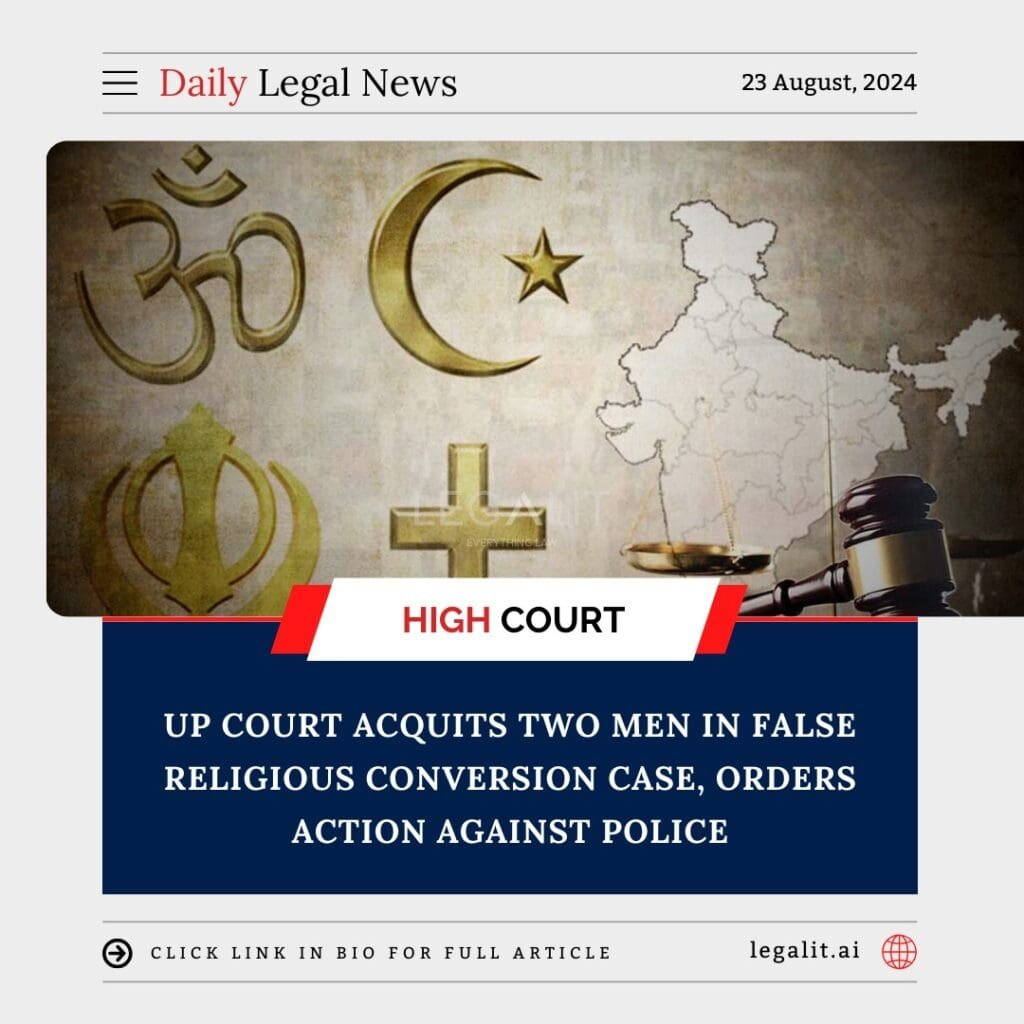
In a significant judgment that underscores the need for accountability and fairness in law enforcement, a court in Uttar Pradesh has acquitted two men accused of religious conversion, citing a lack of evidence and labeling the case as false. The court’s ruling also includes a directive for disciplinary action against the police officers involved, raising critical questions about the integrity of the investigation and the broader implications of such cases.
Background of the Case:
- The Accusations: The two men, whose identities have not been disclosed for privacy reasons, were accused of forcibly converting individuals to another religion. The charges were based on allegations that they had coerced several people into converting, using threats and inducements. These accusations were part of a broader context of increasing scrutiny and legal action against religious conversions in certain parts of India, particularly in Uttar Pradesh.
- The Police Investigation: Following the filing of the complaint, local police quickly arrested the two men and initiated legal proceedings. However, as the case progressed, it became apparent that the evidence against the accused was either insufficient or fabricated. The defense argued that the charges were baseless and that the accused were being targeted for their religious beliefs rather than any criminal activity.
- The Role of the Media and Public Opinion: The case attracted significant media attention, with various reports either supporting or condemning the actions of the accused. This public scrutiny added pressure on both the judiciary and law enforcement to ensure a fair and impartial investigation. However, the media coverage also highlighted the sensitive nature of religious conversion cases in India, where such issues often intersect with broader societal tensions.
Court’s Ruling:
- Acquittal Due to Lack of Evidence: After thoroughly examining the evidence presented, the court concluded that there was no substantial proof to support the allegations of forced conversion. The judge noted several inconsistencies in the prosecution’s case, including contradictory witness statements and the absence of any direct evidence linking the accused to the alleged crimes. As a result, the court acquitted both men, declaring that the charges against them were unfounded.
- Order for Disciplinary Action Against Police: In a move that highlights the court’s concern over the handling of the case, the judge ordered disciplinary action against the police officers involved in the investigation. The court criticized the police for their apparent negligence and possible bias in pursuing a case without proper evidence. The ruling called for an internal inquiry to determine the extent of the misconduct and to hold the responsible officers accountable.
- Implications of the Ruling: The court’s decision not only exonerates the accused but also sends a strong message about the importance of due process and the dangers of pursuing cases based on weak or politically motivated evidence. The ruling serves as a reminder that the judicial system must remain vigilant against potential abuses of power by law enforcement, especially in cases that touch on sensitive issues such as religious conversion.
Broader Context and Significance:
- Religious Conversion Laws in India: The case is set against the backdrop of stringent laws regulating religious conversions in several Indian states, including Uttar Pradesh. These laws, often referred to as anti-conversion laws, are designed to prevent conversions that are deemed forced or fraudulent. However, critics argue that these laws can be misused to target minority communities or suppress religious freedoms.
- Judicial Oversight of Law Enforcement: The court’s decision to order action against the police underscores the crucial role of judicial oversight in maintaining the integrity of the legal process. It reflects the judiciary’s responsibility to ensure that law enforcement agencies conduct their investigations impartially and without prejudice, particularly in cases that have significant social or political implications.
- Impact on Future Cases: This ruling could have far-reaching effects on how similar cases are handled in the future. It may lead to more stringent scrutiny of evidence in religious conversion cases and discourage the filing of frivolous or politically motivated charges. Moreover, it could prompt law enforcement agencies to adopt more rigorous standards in investigating such cases, knowing that their actions will be subject to judicial review.
Challenges and Considerations:
- Ensuring Fairness in Religious Conversion Cases: The challenge moving forward will be to strike a balance between preventing genuine cases of forced conversion and protecting the rights of individuals to freely choose their religion. Courts and law enforcement must work together to ensure that all cases are handled with the utmost fairness, avoiding any form of bias or discrimination.
- Rebuilding Trust in Law Enforcement: The order for disciplinary action against the police highlights the need to restore public trust in law enforcement agencies. Transparency in the inquiry process and accountability for any wrongdoing will be crucial in rebuilding confidence in the system.
- Addressing Media Sensationalism: The media’s role in shaping public opinion on such cases cannot be ignored. Responsible reporting that focuses on facts rather than sensationalism will be essential in ensuring that justice is not compromised by public or political pressure.
Conclusion:
The acquittal of the two men in the false religious conversion case in Uttar Pradesh is a significant ruling that underscores the importance of evidence-based investigations and judicial oversight. By ordering disciplinary action against the police, the court has reinforced the principle that law enforcement must act impartially and responsibly, especially in cases involving sensitive issues like religious conversion. This decision serves as a crucial reminder of the need to protect individual rights and uphold the rule of law in a diverse and pluralistic society. As the legal and social implications of this case continue to unfold, it will likely serve as a precedent for how similar cases are handled in the future, shaping the discourse on religious freedom and judicial accountability in India.